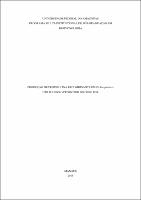| ???jsp.display-item.social.title??? |


|
Please use this identifier to cite or link to this item:
https://tede.ufam.edu.br/handle/tede/5228Full metadata record
| DC Field | Value | Language |
|---|---|---|
| dc.creator | Assunção, Enedina Nogueira de | - |
| dc.creator.Lattes | http://lattes.cnpq.br/0502304950499185 | por |
| dc.contributor.advisor1 | Astolfi Filho, Spartaco | - |
| dc.contributor.advisor1Lattes | http://lattes.cnpq.br/2699190136695057 | por |
| dc.date.issued | 2015-09-26 | - |
| dc.identifier.citation | ASSUNÇÃO, Enedina Nogueira. Produção de proinsulina recombinante em Pichia pastoris utilizando o promotor do gene PGK. 2015. 138 f. Tese (Doutorado em Biotecnologia) - Universidade Federal do Amazonas, Manaus, 2015. | por |
| dc.identifier.uri | http://tede.ufam.edu.br/handle/tede/5228 | - |
| dc.description.resumo | De acordo com os indicadores da Organização Mundial de Saúde (OMS) o diabetes mellitus deve alcançar 333 milhões de pessoas em 2025 no mundo e em 2030 na América Latina será a segunda causa de morte, por isso o aumento da produção de insulina torna-se uma necessidade para suprir as futuras demandas de mercado. Os sistemas de expressão em leveduras tipo Pichia pastoris tem sido cada vez mais utilizados e tem-se mostrado como atraentes alternativas para a expressão de proteínas para fins industriais. Dessa forma, este trabalho tem como objetivo principal a produção de proinsulina humana por Pichia pastoris utilizando o promotor do gene PGK. O gene A1 que codifica o precursor da insulina foi sintetizado quimicamente com codóns otimizados para a expressão em P. pastoris. Esse gene foi clonado em vetor de expressão/secreção sob controle do promotor PGK de P. pastoris e integrado no genoma de P. pastoris GS115. A produção de proinsulina recombinante foi realizada em meio líquido YPD em frascos agitados a 30°C, a 180 rpm. A análise da proinsulina expressa em P. pastoris foi realizada por eletroforese em gel desnaturante de poliacrilamida e Western-blotting e mostrou massa molecular de aproximadamente 7,5 kDa. O clone recombinante A140 que apresentou maior resistência a zeocina e sinal positivo mais intenso no imunodot-blotting foi utilizado para estabelecer condições melhores de expressão/secreção de proinsulina em planejamento fatorial estatístico experimental. As condições de cultivo que se mostraram melhores para a produção da proinsulina foram: composição do meio de cultivo (dextrose 7,5%, extrato de levedura 1% e peptona 0,15%), temperatura de 25°C e pH do meio igual a 7,0. O clone A140 nas melhores condições de cultivo atingiu biomassa total de 50g/L e nível de expressão de insulina de 0,83g/L em 72 horas de cultivo. A expressão de proinsulina em altos níveis utilizando o promotor PGK em P. pastoris faz esse sistema de expressão atrativo para produção da proinsulina humana e outras proteínas de interesse industrial. | por |
| dc.description.abstract | According to the World Health Organization (WHO), diabetes mellitus is expected to reach 333 million by 2025 and around 2030 is going to be the second cause of death in Latin America. Therefore, an insulin production increasing becomes a need to meet future market demands. The heterologous expression system in Pichia pastoris have been increasingly used and has proven to be an attractive alternative for over expressing human genes for biotechnological purposes. Thus, this work has as main objective to produce human proinsulin by P. pastoris using a PGK gene promoter. A1 gene codes for the insulin precursor and was chemically synthesized with optimized codons for P. pastoris. This gene was cloned into expression vector / secretion under control of PGK P. pastoris promoter and integrated into the genome of P. pastoris GS115. Transformant clones were selected for increased zeocin production and from dot-blotting. The production of recombinant proinsulin was performed in YPD liquid in shake flasks at 30 ° C, 180 rpm. The supernatant was clarified by centrifugation, and detection of recombinant proteins by ELISA, electrophoresis in denaturing polyacrylamide gel, Western-blotting and finally chromatography for size exclusion. Best conditions for expression / secretion of proinsulin were established through statistical experimental design detecting the expression level by ELISA. The amount of pre-proinsulin mRNA was determined from two samples of two contrasting conditions of A140 clone with the highest and lowest production of proinsulin using Real-Time PCR (qPCR). As results, the recombinant clones that had higher resistance to Zeocin also showed more intense positive signs in the dot-blotting. Proinsulin coding sequence (A1) was efficiently expressed in P. pastoris and secreted into the cell culture supernatant, with molecular weight of approximately 7.5 kDa. The A140 clone showed significant productivity in production level within 48 to 72 hours after the improvement of the YPD culture medium showed level of 0.83 g/L of insulin expression at 72 hours, for total biomass of about 50g / L. High levels of proinsulin expression with PGK promoter using P. pastoris as host make this heterologous expression attractive for human proinsulin production as well as other industrial proteins. | eng |
| dc.format | application/pdf | * |
| dc.thumbnail.url | http://tede.ufam.edu.br//retrieve/13839/Tese%20-%20Enedina%20Nogueira%20de%20Assun%c3%a7%c3%a3o.pdf.jpg | * |
| dc.language | por | por |
| dc.publisher | Universidade Federal do Amazonas | por |
| dc.publisher.department | Instituto de Ciências Biológicas | por |
| dc.publisher.country | Brasil | por |
| dc.publisher.initials | UFAM | por |
| dc.publisher.program | Programa de Pós-Graduação em Biotecnologia | por |
| dc.rights | Acesso Aberto | por |
| dc.subject | Proinsulina | por |
| dc.subject | Codóns otimizados | por |
| dc.subject | Vetor de expressão | por |
| dc.subject | Promotor PGK | por |
| dc.subject.cnpq | CIÊNCIAS BIOLÓGICAS | por |
| dc.title | Produção de proinsulina recombinante em Pichia pastoris utilizando o promotor do gene PGK | por |
| dc.type | Tese | por |
| Appears in Collections: | Doutorado em Biotecnologia | |
Files in This Item:
| File | Description | Size | Format | |
|---|---|---|---|---|
| Tese - Enedina Nogueira de Assunção.pdf | Publicação Total Autorizada | 3.82 MB | Adobe PDF |  Download/Open Preview |
Items in DSpace are protected by copyright, with all rights reserved, unless otherwise indicated.




